|
|
|
Sort Order |
|
|
|
Items / Page
|
|
|
|
|
|
|
| Srl | Item |
| 1 |
ID:
140328
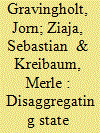

|
|
|
|
|
| Summary/Abstract |
This conceptual and methodological article makes the case for a multidimensional empirical typology of state fragility. It presents a framework that defines fragile statehood as deficiencies in one or more of the core functions of the state: authority, capacity and legitimacy. Unlike available indices of state fragility, it suggests a route towards operationalisation that maintains this multidimensionality. The methodology presented should help in future research to identify clusters of countries that exhibit similar constellations of statehood, whereby ‘constellation’ refers to the specific mix of characteristics across the three dimensions. Such an identification of empirical types would fulfil a demand that exists both in academic research and among policy circles for finding a more realistic model of fragility at an intermediate level between single-case analyses and the far-too-broad category of state fragility.
|
|
|
|
|
|
|
|
|
|
|
|
|
|
|
|
| 2 |
ID:
124151


|
|
|
|
|
| Publication |
2013.
|
| Summary/Abstract |
This article focuses on the 2010-2011 Special Election Court crisis, which serves as a microcosm of the broader post-2001 political network dynamics in which opportunistic practices of bargaining and the instrumentalization of identities have emerged as key features of Afghan politics. Post-2001 international state-building has produced a 'network state' where the state and political networks have become co-constitutive in state-building. This has produced the democratic façade of a state, underpinned by informal power structures and networks. In light of this analysis, a successful international exit from Afghanistan and post-2014 state survival may depend as much on the political stability of the empowered networks as on the strength of the Afghan National Security Forces and the outcome of the ongoing reconciliation and negotiation with the Taliban.
|
|
|
|
|
|
|
|
|
|
|
|
|
|
|
|
| 3 |
ID:
133264
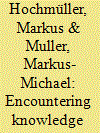

|
|
|
|
|
| Publication |
2014.
|
| Summary/Abstract |
After nearly seven years of ever-escalating violence related to the Mexican 'war on drugs', in 2013 Mexico entered the International Crisis Group's (icg) 'observatory' of countries facing a violent crisis. In this article we critically interrogate this 'Mexican turn' of the icg, as well as its accompanying forms of crisis knowledge production. By applying analytical insights from critical policy analysis and postcolonial security studies, we highlight the Western-centrism embedded in the icg's perspective on Mexico's security crisis. In analysing this perspective on questions of drug trafficking, statehood and indigenous justice, we demonstrate how this Western-centrism produces a de-politicising and overly technocratic crisis narrative. The article concludes that, through its Western-centric 'Mexican turn', the icg has been able to reaffirm its standing as a uniquely influential and internationally recognised crisis expert by showcasing its awareness of newly emerging crisis situations, as well as its possession of the necessary crisis-solving expertise.
|
|
|
|
|
|
|
|
|
|
|
|
|
|
|
|
| 4 |
ID:
101014


|
|
|
|
|
| Publication |
2010.
|
| Summary/Abstract |
The resolution of the Israeli-Palestinian conflict has long occupied a prominent place on the foreign agenda of the European Union (EU). Over the past 40 years, the member states of the EU have defined with increasingly coherence their approach to the resolution to the Israeli-Palestinian conflict: a commitment to Israel's right to live in peace and security and support of the Palestinians to national self-determination. At the same time, European discourse on the Israeli-Palestinian conflict has shifted as its own internal needs and strategic concerns have changed. This changing narrative has impacted critically on the policy instruments and approach adopted by the EU to the conflict. Through an analysis of European statements and speeches, this article argues that European discourse in the 1980s and 1990s was underscored by a normative, justice-based framing. The collapse of peace process in 2000 has led to a noticeable securitization of European discourse on the conflict, one now marked by a growing sense of 'risk, danger, and urgency' and a fear that the conflict has begun to impact negatively on its domestic stability.
|
|
|
|
|
|
|
|
|
|
|
|
|
|
|
|
| 5 |
ID:
169929
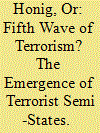

|
|
|
|
|
| Summary/Abstract |
Drawing on Rapoport’s four waves thesis, this study asks whether the emergence of terrorist semi-states (TSS) in the 21st-century MENA region and Pakistan mean that we are seeing the beginning of a new (fifth) wave. We define a TSS as a rebel group that a) has control over portions of a weak state’s territory, maintaining governance there; b) but still launches terrorist attacks against third-party states. To be considered a fifth wave, the new terrorism phenomenon at hand must both fit Rapoport’s criteria of a wave (be global, have the same driving force) and also be significantly different from the prior wave. Clearly, the TSSs are different from the religious terror groups of the fourth wave in key respects: they prioritize territorial control, they engage in a much wider array of governance activities (not just social services), most of their victims have been members of the same religion—namely, Muslims (which suggests that they are driven more by the pursuit of power than by Jihad); and finally, their behavior (though not their statements) shows they have a local rather than a universal agenda. The main counter-argument is that TSSs are all Islamic and have so far not been exported globally.
|
|
|
|
|
|
|
|
|
|
|
|
|
|
|
|
| 6 |
ID:
191906
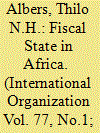

|
|
|
|
|
| Summary/Abstract |
What is the level of state capacity in developing countries today, and what have been its drivers over the past century? We construct a comprehensive new data set of tax and revenue collection for forty-six African polities from 1900 to 2015. Our data show that polities in Africa have been characterized by strong growth in fiscal capacity on average, but that substantial heterogeneity exists. The empirical analysis reveals that canonical state-building factors such as democratic institutions and interstate warfare have limited power to explain these divergent growth paths. On the other hand, accounting for the relationship between African polities and the international environment—through the availability of external finance and the legacy of colonialism—is key to understanding their differing investments in fiscal capacity. These insights add important nuances to established theories of state building. Not only can the availability of external finance deter investment in fiscal capacity, but it also moderates the efficacy of canonical state-building factors.
|
|
|
|
|
|
|
|
|
|
|
|
|
|
|
|
| 7 |
ID:
112799
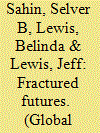

|
|
|
|
|
| Publication |
2012.
|
| Summary/Abstract |
This paper examines Indonesia's democratic state capacity-building in terms of transformations in West Timor, particularly around manganese mining. It is structured on the basis of three complementary sets of arguments. Firstly, democratic capacity-building is essentially a power-driven process as it seeks to re-arrange the way in which power is distributed. This process is shaped by the relative capabilities of a variety of societal interests struggling to dominate the control of state power at multiple sites of a highly competitive 'field of power'. Secondly, Indonesia's democratic decentralisation experience has produced uneven results, both between and within provinces. This is largely because the dynamic of the reform process is determined by the relative capabilities of competing social forces to engage in the political landscape and influence revenue generation and resource management policies. Thirdly, manganese mining, which has recently emerged as a quick method of revenue generation in resource-poor West Timor, provides an important case study that reflects the structural dynamics of state (in)capacity.
|
|
|
|
|
|
|
|
|
|
|
|
|
|
|
|
| 8 |
ID:
178958
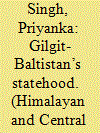

|
|
|
| 9 |
ID:
065269
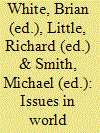

|
|
|
|
|
| Edition |
3rd ed.
|
| Publication |
Hampshire, Palgrave Macmillan, 2005.
|
| Description |
xvii, 326p.
|
| Standard Number |
9781403946119
|
|
|
|
|
|
|
|
|
|
|
|
Copies: C:1/I:0,R:0,Q:0
Circulation
| Accession# | Call# | Current Location | Status | Policy | Location |
| 050041 | 909.83/WHI 050041 | Main | On Shelf | General | |
|
|
|
|
| 10 |
ID:
087304
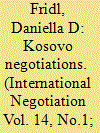

|
|
|
|
|
| Publication |
2009.
|
| Summary/Abstract |
Why do negotiations fail, how do we explain this failure through negotiations theory and what lessons can we draw for the future? What is the role of the mediator and to what extent do a mediator's values and interests affect the outcome of the negotiations? These questions are analyzed and answered through a discussion of the Kosovo negotiations and theoretical concepts of power imbalance, mediator's formula, trust, interests and perceptions. The analysis evaluates why the mediation efforts failed to produce a mutually acceptable agreement.
|
|
|
|
|
|
|
|
|
|
|
|
|
|
|
|
| 11 |
ID:
188069
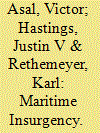

|
|
|
|
|
| Summary/Abstract |
Why do some insurgent organizations launch maritime attacks? To examine why organizations would engage in this behavior we draw on a new dataset of insurgencies to investigate the organizational characteristics associated with maritime attacks. We find that there are two types of maritime attacks by insurgencies. While both types of attacks are associated with the trappings of a state, beyond those factors, maritime revenue-raising attacks take place in a milieu of criminal activity, while maritime non-revenue-raising attacks are associated with an insurgency’s organizational sophistication and capacity.
|
|
|
|
|
|
|
|
|
|
|
|
|
|
|
|
| 12 |
ID:
162493
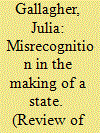

|
|
|
|
|
| Summary/Abstract |
This article draws on a Kleinian psychoanalytic reading of Hegel’s theory of the struggle for recognition to explore the role of international misrecognition in the creation of state subjectivity. It focuses on Ghana’s early years, when international relations were powerfully conceptualised and used by Kwame Nkrumah in his bid to bring coherence to a fragile infant state. Nkrumah attempted to create separation and independence from the West on the one hand, and intimacy with a unified Africa on the other. By creating juxtapositions between Ghana and these idealised international others, he was able to create a fantasy of a coherent state, built on a fundamental misrecognition of the wider world. As the fantasy bumped up against the realities of Ghana’s failing economy, fractured social structures, and complex international relationships, it foundered, causing alienation and despair. I argue that the failure of this early fantasy was the start of Ghana’s quest to begin processes of individuation and subjectivity, and that its undoing was an inevitable part of the early stages of misrecognition, laying the way for more grounded struggles for recognition and the development of a more complex state-subjectivity.
|
|
|
|
|
|
|
|
|
|
|
|
|
|
|
|
| 13 |
ID:
179931
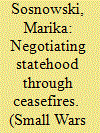

|
|
|
|
|
| Summary/Abstract |
This paper examines how ceasefires can influence elements of statehood. It adds to scholarship that views statehood as being in a continuous process of change by conceptualising international ceasefires as the negotiation of an embryonic type of wartime order that has ramifications for how power and authority are dispersed among competing actors in civil war. Through the example of the Syrian de-escalation zones, the paper suggests that the ceasefire not only affected the use of violence but recalibrated relations between international and local actors for control over diplomacy, security, territory, and citizenship.
|
|
|
|
|
|
|
|
|
|
|
|
|
|
|
|
| 14 |
ID:
144076
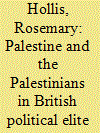

|
|
|
|
|
| Summary/Abstract |
This article examines how the Palestinians have been represented in British political elite discourse between 1915 and 2015 as an exploration into the role of such discourse in framing the identity and thence shaping the fate of a community or people seeking national independence. It also makes some observations about the significance of political violence or war in bringing about paradigm shifts in the discourse. The analysis reveals that the way the British depicted the Palestinian Arabs and their cause has changed over time, but at no point did the discourse identify independent statehood for the Palestinians as a central or stand-alone objective of policy.
|
|
|
|
|
|
|
|
|
|
|
|
|
|
|
|
| 15 |
ID:
108521
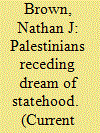

|
|
|
| 16 |
ID:
134370


|
|
|
|
|
| Summary/Abstract |
Afghanistan is often mentioned as a threat to the Central Asian states. Potential spillovers of violence, extremism, terrorism and dangers related to the drug trade are seen as significant security issues for the region. This article takes a different approach. Taking a performative view of statehood, we see state identities as socially constituted, partly by involvement in regional and global processes. From research on border management, the Northern Distribution Network, and various forms of bilateral cooperation between Afghanistan and the Central Asian states, we argue that Afghanistan has become an arena where the Central Asian states can participate. How the Central Asian states bordering on Afghanistan are treated as relevant participants, regardless of actual state capacity or the effectiveness of their policies, serves to constitute and confirm their sovereignty and relevance to the international community, and ultimately their statehood. By emphasizing the important state effects of their performance, our perspective differs from accounts of Central Asian states as either ‘weak’ or ‘strong’, and the tendency to depict Central Asian engagement in regional initiatives as mere window-dressing.
|
|
|
|
|
|
|
|
|
|
|
|
|
|
|
|
| 17 |
ID:
191015


|
|
|
|
|
| Summary/Abstract |
While the debate about further integration is ongoing, the European Union (EU) already shows signs of functioning like a state. The dynamics of the European integration process are defined by the duality of inter-governmentalism and supranationalism. This contradiction encouraged the development of the EU as a new hybrid political organisation. A software-assisted discourse analysis of the European State of the Union Addresses highlights that Presidents of the EU Commission have indeed conceptualised the Union both as a state-like entity and an intergovernmental institution because of its unique process of evolution, as evidenced by parallelism with the US event, the co-occurrence of conventional metaphors of statehood and EU-related metaphors as well as the merging of the concepts of “Europe” and “European Union” in the Addresses. Overall, the Addresses have contributed to creating a context of statehood for the EU on the one hand, and to reinforcing the position of the Presidents of the European Commission of the EU Parliament as leaders of the EU on the other.
|
|
|
|
|
|
|
|
|
|
|
|
|
|
|
|
| 18 |
ID:
122776
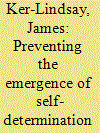

|
|
|
|
|
| Publication |
2013.
|
| Summary/Abstract |
When Kosovo declared independence, in February 2008, it was stated that the move was not an act of self-determination. Instead, the key states that supported the decision insisted that the case for statehood arose from a unique set of circumstances. Kosovo was not a precedent; it was a sui generis case in international politics. This essay considers the arguments underpinning this claim to exclusivity and argues that, taken either individually or collectively, the main justifications used to support Kosovo's 'unique' statehood-such as the abuse of human rights-in fact have serious consequences for other separatist conflicts elsewhere.
|
|
|
|
|
|
|
|
|
|
|
|
|
|
|
|
| 19 |
ID:
103173
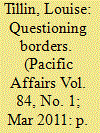

|
|
|
|
|
| Publication |
2011.
|
| Summary/Abstract |
As the world's largest multi-ethnic democracy, India has a federal constitution that is well-equipped with administrative devices that offer apparent recognition and measures of self-governance to territorially concentrated ethnic groups. This article analyzes how demands for political autonomy-or statehood-within the federal system have been used as a frame for social movement mobilization. It focuses on the most recent states to have been created in India: Chhattisgarh, Jharkhand and Uttarakhand, which came into being in 2000. These are the first states to have been created in India on a non-linguistic basis. Their creation has triggered questions about whether the creation of more, smaller states can improve political representation and help to make the state more responsive to diverse needs in India. This article draws attention to the processes which have brought borders into question, drawing social movements and political parties into alignment about the idea of creating new states. It ultimately looks at why the creation of states as a result of such processes may not lead to more substantive forms of political and economic citizenship on the part of marginalized communities. While the focus of the analysis will be on the processes that led up to statehood, the conclusions offer some insights into why pro-poor policy shifts at the national level in India have uneven regional effects. Despite the change in national political regime in India with the election of the Congress-led United Progressive Alliance in 2004, marginalized groups in India continue to experience the state through the refractive lens of multiple regional political histories.
|
|
|
|
|
|
|
|
|
|
|
|
|
|
|
|
| 20 |
ID:
183222


|
|
|
|
|
| Summary/Abstract |
At the height of the Syrian civil war, many observers argued that the Syrian state was collapsing, fragmenting, or dissolving. Yet, it never actually vanished. Revisiting the rising challenges to the Syrian state since 2011 – from internal collapse through external fragmentation to its looming dissolution by the ‘Islamic State’ – provides a rare opportunity to investigate the re-enactment of both statehood and international order in crisis. Indeed, what distinguishes the challenges posed to Syria, and Iraq, from others in the region and beyond is that their potential dissolution was regarded as a threat not merely to a – despised – dictatorial regime, or a particular state, but to the state-based international order itself. Regimes fall and states ‘collapse’ internally or are replaced by new states, but the international order is fundamentally questioned only where the territorially delineated state form is contested by an alternative. The article argues that the Syrian state survived not simply due to its legal sovereignty or foreign regime support, but also because states that backed the rebellion, fearing the vanishing of the Syrian nation-state in a transnational jihadist ‘caliphate’, came to prefer its persistence under Assad. The re-enactment of states and of the international order are thus ultimately linked.
|
|
|
|
|
|
|
|
|
|
|
|
|
|
|
|
|
|
|
|
|